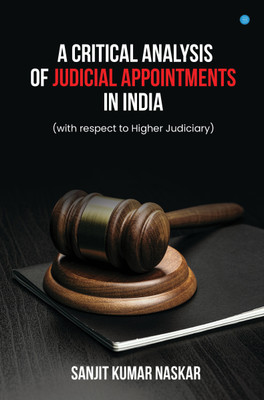A Critical Analysis of Judicial Appointments in India with respect to Higher Judiciary(English, Hardcover, Kumar Naskar Sanjit)
Quick Overview
Product Price Comparison
The Author Sanjit Kumar Naskar in this book titled A CRITICAL ANALYSIS OF JUDICIAL APPOINTMENTS IN INDIA has referred a wide range of resources viz. books, online law journals, articles from authoritative online resources. Firstly, the Author would review the book written by Prof. Madhav Godbole. In his book titled 'The Judiciary and Governance in India', he advocates for the Judicial Accountability in the higher judiciary and the need for such judicial accountability in India. However, Prof. Madhav Godbole though touched the aspect of accountability of lower judiciary in the form of transfers made by the higher judiciary and also had discussed the politicization of the judiciary in this regard, he completely ignores the transparency in the appointment process regarding the lower judiciary. Secondly, another important literary source which the Author has referred is regarding the Phd.thesis by Prof. V.R. Jayadevan entitled 'Judicial Creativity in Constitutional Interpretation'. The Author has referred this thesis in light of explaining the historical background of system of appointments of judges in the higher judiciary as well as to support the arguments being raised by the Author in relation to the selection of judges and their condition of services in the higher judiciary. Although the research work done by Prof. Jayadevan is detail oriented and well established and argumentative, still the Author finds the holding of Prof. Jayadevan regarding the adoption of seniority rule in the matter of the appointment of CJI in India not proper and has referred the argument of Justice Katju (Refer Chapter II of Dissertation) in order to counter the argument put forward by Prof. Jayadevan in his work. Thirdly, another major literary resource referred by the Author in the current dissertation is of the article 'The NJAC Act - Is it the perfect remedy?' written by Vikram Mishra and Ananth Balaji. In their article, the writers have focused on the NJAC Act, 2014 and analyzed the Act in a critical manner. The Author while critically analyzing the NJAC, Act, 2014 in the Chapter - III of the dissertation has referred to this article and supported his arguments based on the arguments proposed by the writers in the abovementioned article. Though, this article is argumentative and represents the shortcomings of the NJAC Act, 2014 in a plain and language which is easily comprehensible yet this article fails to appreciate the salient features of the NJAC Act, 2014. Although it explains in a precise manner the shift from the collegium system of selection of judges in the higher judiciary to system of appointment of judges in the higher judiciary by the commission established under the NJAC Act, 2014. Lastly, the Author has referred the work of Prof. Tom S. Clark in his book titled 'The Limits of Judicial Independence' which deals with the limits of judicial independence where the author holds that in order to see whether the judiciary is independent or not depends upon the judicial behaviour of the judges of a particular legal system. Although the judicial behaviour holds the key to bring desirable results in the legal system of a particular country still the Author feels that somewhere down the line Prof. Tom S. Clark is not able to justify the significance of the role of judicial behaviour as an additional criteria of selection of judges in the higher judiciary besides measuring the judicial independence of a particular legal system.


